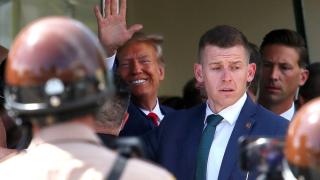The US Justice Department recently unsealed the federal indictment charging former President Donald Trump with 37 criminal counts related to his handling of classified documents after leaving the White House. USSC Research Associate Victoria Cooper discusses how the indictment could influence the looming 2024 US presidential race.
In your view, how will Trump’s indictment impact his campaign for the Republican presidential nomination?
You would think that an indictment of the former president would injure his chances at becoming the Republican nominee ahead of the next presidential election. But, the reality is that Trump’s supporters are decidedly rusted on. Most die-hard Republican voters (the ones that turn out to vote in primaries) follow his lead and back him all the way. We saw this last year leading up to the midterms; the vast majority of Trump-backed candidates, even the most unconventional, won the nomination for their respective general elections because primary voters followed Trump’s cues.
A recent poll showed over three quarters of self-identified Republican voters echo Trump’s insistence that this indictment is ‘politically motivated’. Almost two-thirds have said that it doesn’t affect their view of the former president, and a fair portion said the indictment only makes them support him more. That doesn’t mean Trump’s nomination ahead of 2024 is secured. Anything can happen. But it’s certainly amazing to witness how an indictment has not been an entirely negative thing for Trump, and has actually helped to galvanise political support around the former president.
In the crowded GOP primaries field, what does Trump’s indictment mean for other hopefuls like his current top rival DeSantis? How could it impact their campaigns?
The field is increasingly crowded with three newcomers announcing their intentions to run in the last week. The easiest way to think about the Republican primary field at this stage is in three ‘buckets’: (1) Trump, (2) Ron DeSantis, the Governor of Florida, and (3) the rest. DeSantis – the most likely non-Trump candidate to succeed – does not have nearly enough base support yet to overtake former President Trump, and ‘the rest’ have even less than him (roughly less than one to three per cent of the vote each). Notably, DeSantis has mirrored several of Trump’s policy gripes (e.g. around 'wokeism’ and elitism in Washington) and style of politics in order to corral and maintain his popularity among Republican base voters in Florida. So, DeSantis, for one, faces a tough calculation about how to beat the former president at his own game, without explicitly criticising him, and while pointing out what exactly makes him a more viable candidate than Trump. While Trump dominates the field, the other candidates will have to make a similar calculation: Do they go after Trump’s supporters, copy Trump’s messaging about the corruption of the White House and establishment politics, while trying to use these scandals to say that the former president is too ‘damaged’ or distracted to run? Or, do they run a completely different campaign and vie for a new voter base by rebuking Trump’s criticisms of the law and US institutions, and providing a new direction for the Republican party?
Why does Trump’s indictment matter for Australia?
The indictment doesn’t necessarily prompt a new reaction for Australia. It’s an old feeling.
When Trump came to power in 2017, he destabilised Australia’s vision of the United States as an international partner that abides by standards, norms and institutions. He withdrew from international trade organisations and the Paris Climate Accords. He marked an inward pivot in US foreign policy. And all those things took adjustment for Australia, which had grown used to a steady stream of US international engagement. It caused Australia to re-evaluate how much reliance it places on the United States for its security guarantees. That’s not to say Trump caused a break in the alliance – far from it. In fact, Australia arguably fared better under the former president than almost any other US ally. But, when we read about the former president’s alleged mishandling of national security information that could have implications for Australia and its international partners, it invokes that familiar feeling of insecurity.






